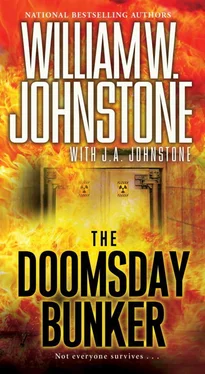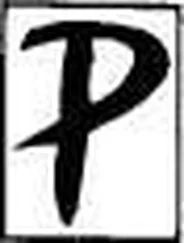Earlier, Larkin had had dinner with Susan, Jill, Trevor, Bailey, and Chris. The kids didn’t know what he was going to be doing, but the adults did. Even though Larkin didn’t intend it as such, there was an unmistakable feeling that this might be the last time they would all see each other. It had always been like that when men went off to war, he supposed, no matter how far back you went in history.
Later, when the two of them were alone, he had held Susan for a long time, each drawing strength and comfort from the other.
Then he had saddled up, figuratively speaking, and left to do the job that had fallen to him.
Now the eight men turned to face Moultrie, who gave them a smile of encouragement. Larkin pressed a button on the elevator’s control panel. The door closed, and with a slight lurch, the elevator started up toward the surface.
The elevator opened in the rear wall of a large basement that had been used for storage when this place was a missile base. On the far side of the space was a broad ramp where trucks had backed down into the basement so they could unload. Larkin wasn’t clear on how the giant Nike Hercules missiles had been loaded into their launch silos, but at this point it didn’t matter. The tops of those silos had been sealed up and covered with tons of earth, so no one could ever go in or out that way.
When Larkin stepped out of the elevator, holding the AR-15 ready in case of trouble even though sensors reported nothing moving around up here, he couldn’t resist the urge to tip his head back and look upward. The building above this basement had mostly collapsed into it, leaving piles of rubble everywhere and open air above.
He was looking up at the sky, Larkin thought. For the first time in almost a year, he was gazing at the heavens again, as man had done from time immemorial.
Unfortunately, there wasn’t a damned thing to see. For one thing, it was night, and for another the thick overcast that had hung above the earth for months was still in place. The gloom was thick as mud. There was too much debris down here for the team to move around safely without any light, so Larkin let the others emerge from the elevator, then said, “We’ll wait right here for morning.”
That was part of the plan they had all gone over ahead of time, so no one was surprised. If the others were anything like Larkin, they were eager to get out of here and back onto the surface, but they all knew it would be better not to show any lights that could draw attention to them.
The engineers, doubling as environmental techs for this mission, busied themselves taking readings, gathering their samples, and then going back into the elevator to check them so the lights they used to see the instruments wouldn’t show. Larkin tried not to hover over them, but he couldn’t stop himself from asking, “How does it look?”
“The air quality has a slightly higher particulate level than usual,” one of the men responded. “That’s probably due to the massive quantities of ash that were lifted into the upper-atmosphere as a result of the nuclear explosions. That ash has been circling the planet, carried by the upper-level winds, but slowly settling back to earth ever since.”
“It wouldn’t have all come back down by now?”
The man shook his head. “No, it may take a couple of years, maybe even longer, before the so-called nuclear winter is over. By this point, you probably won’t be able to see what’s in the air, but if your helmet was off, you could smell it, like you were in the vicinity of a big forest fire.”
“And that ash is radioactive,” Larkin said, trying not to sound dispirited.
The other engineer said, “Yes, but a lot of things in our normal lives were radioactive. It’s a matter of how much. By now the radiation from the contaminants in the air, as well as in the soil and the debris that’s left, has decayed to the point that it’s not extremely hazardous.”
“You’re saying we can take off these suits and breathe the air?”
“Well,” the man said, shrugging, “short-term exposure should be fine. If you were to spend years living in these conditions, your risk of developing cancer or some other form of radiation-related sickness would be somewhat higher than the normal, everyday risk in our old lives, before the war. But probably not dramatically so.”
“But don’t go taking off that hazmat suit just yet,” the first man said. “Give us a chance to take some more readings once we’re actually up on the surface, just to be sure.”
That made sense, Larkin thought. Again, they were going to be careful instead of reckless… although a big part of him wanted to yank that helmet off right now.
The three hours or so until dawn were some of the longest of Larkin’s life. And when morning finally did arrive, the blackness faded to gray at such a gradual pace it was almost indistinguishable. Only when Larkin realized he could see the piles of rubble in the basement did he understand that the time had come to move out.
The men were more than ready. They had sat down in the elevator, but when Larkin told them to get ready, they scrambled to their feet as quickly as they could in the bulky suits. He studied the wreckage in the basement and picked out a path through the rubble to the ramp, which appeared to be intact. Turning his head a little, Larkin said to the others, “Follow me.”
He led the way across the basement, up the ramp, and into the open. Setting foot on actual ground, rather than steel or concrete or tile, made another thrill go through Larkin. He paused and looked around while he waited for the rest of the team to climb up out of the basement.
Larkin had seen the aftermath of numerous wildfires in his life, and that was what the scenery around the Hercules Project reminded him of. Gray, barren hillsides met his gaze no matter where he looked. The scrubby trees that had covered so much of the landscape around here were all gone, except for a few twisted trunks with dead branches extending from them like skeletal fingers.
The buildings had been flattened by the concussion of the nuclear blast twenty miles away. Here and there a small piece of cinder-block wall stuck up from the charred ground. The brick wall along the perimeter, which should have been visible, was nowhere to be seen. Larkin looked in the direction of downtown Fort Worth, but in the persistent gloom the horizon quickly faded to a hazy nothingness.
The clouds overhead were thick and gunmetal gray as they scudded slowly along, driven by a chilly wind. The sealed suits protected the men from that wind and retained their body heat, keeping them comfortable. Right now, though, Larkin wouldn’t have minded feeling the cold on his face. It would remind him that he had climbed up out of the ground and was walking on the earth again like a man.
He turned to the two engineers, who were studying their instruments. “How’s it look?”
“The readings are consistent with the ones we took down in the basement,” one of the men reported. “I think we should stay suited up for a while, though, just to be on the safe side.”
A surge of recklessness welled up inside Larkin for a moment. He had survived the greatest disaster to hit the planet since that asteroid had come along and wiped out the dinosaurs. He was sick and tired of playing it safe.
However, the more pragmatic part of his nature won out. He nodded and said, “We’ll keep the suits on while we take a look around.”
Larkin could tell where the main road leading into the project had been. Some of the asphalt was still visible. He led the men along it toward the county road. As they came closer, he saw the rusted hulks of hundreds of cars, trucks, vans, and SUVs along the route where people had tried to flee. Some of them were overturned and lay on their tops or sides. Others were scattered haphazardly in the ditches, as if a giant hand had picked them up and flung them around. The blast wave had done that, Larkin knew.
Читать дальше









